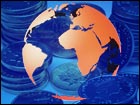|
A patchwork recovery
|
 |
February 2, 2002: 12:31 p.m. ET
WEF panels say US economy looks set to recover, but structural reforms needed in Europe, Japan.
By Staff Writer Mark Gongloff
|
NEW YORK (CNN/Money) - Most participants at the World Economic Forum's annual meeting here believe the global economy will eventually recover, but many think it will be a patchwork recovery, unlike the synchronized recession of 2001.
Brainstorming sessions and workshops Thursday and Friday produced a general consensus that U.S. policy makers, particularly the Federal Reserve, had responded appropriately to last year's recession. The world's other large economies, however, need to catch up.
Most participants thought the U.S. economy is set for a recovery, though there was some disagreement about the size and strength of that recovery. Many expect a weak, slow recovery in the United States, and some even expect another reversal before sustainable growth returns. CEOs in the United States are among those most pessimistic, according to U.S. Treasury Secretary Paul O'Neill, who spoke at a brainstorming session Thursday.
"If you want to talk to negative people, talk to the CEOs," O'Neill said.
O'Neill pointed to strong productivity growth as contributing to strong economic growth in the United States and the world. Other economists believe aggressive fiscal and monetary stimulus, combined with low oil prices, will boost the U.S. economy.
"The U.S. economy has the potential to grow at 3 or 3.5 percent real growth for the indefinite future," O'Neill said.
There was disagreement about whether or not a coordinated policy effort, similar to the one that came immediately after the Sept. 11 terrorist attack, was necessary to lift the global economy. But there was a consensus that Europe needs structural reforms before it can reach sustainable growth levels and that Japan needs serious reforms before it can even stop its recession.
"I do think there is a need for coordination of economic policy, but this doesn't mean that everybody has to do the same thing, and there has to be a recognition that if the individual houses are not in order, the end product cannot be a good one," French finance minister Laurent Fabius said in a workshop Friday.
Though the United States apparently has its house more in order than Europe's or Japan's and is widely acknowledged as the locomotive pulling the rest of the world behind it, it should not be complacent, some participants felt, particularly under the gathering cloud of the Enron Corp. bankruptcy and with serious reforms apparently necessary in corporate accounting.
In fact, there are some similarities between the problems that have befallen Enron, Global Crossing and other U.S. companies and the problems underlying the Asian financial crisis of 1997-98, Princeton economics professor and New York Times columnist Paul Krugman pointed out, including non-transparent business practices and large debts not fully disclosed to shareholders.
"There was from the advanced countries, and the United States in particular, a very strong moralistic streak," Krugman recalled of the debate surrounding the Asian crisis. "They lectured [Asian] countries on their almost moral failings."
"The United States in particular and the West in general should be feeling a little embarrassed about all that lecturing we did to the Third World," Krugman added, drawing a round of applause from the audience at Friday's workshop.
Horst Kohler, managing director of the International Monetary Fund, also drew applause when he called for an end to agricultural subsidies in the United States and Europe that hurt developing countries, a hot-button issue at the latest World Trade Organization meeting in Doha, Qatar.
"I hope this Doha process is not a process where the two elephants, Europe and the United States, make a deal, and in the end, the developing world is [left out]," he said. "There should be a focus of giving the developing countries better access [to world markets], and this includes the serious phasing out of these subsidies, which are absolutely devastating sectors in the poor world."
Kohler also more generally addressed what has been a recurring theme of the discussions at this year's meeting, namely, addressing the needs of developing countries. He echoed comments Thursday by U.S. Secretary of State Colin Powell when he said that one of the best defenses against terrorism was helping to level the playing field for developing countries.
"If you want to get rid of terrorism, there's not only the war in terms of military action, but there's [also] a war in terms of helping poor countries to develop," Kohler said. "My question is: are rich countries fully aware of that?" 
|
|
|
|
|
|

|

